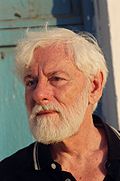A PALESTINIAN village, somewhere in the West Bank.
In the middle of the night, banging on the door and shouts in Arabic: "Israeli army. Open up!"
Somebody -- most often the mother -- opens the door. The heavily armed soldiers rush in and drag the victim out of bed. They throw him to the floor in full view of his wife and children (or parents and siblings), blindfold and handcuff him behind his back, and drag him to a jeep. The victim may be 15 or 70 years old or any age in between.
After several days of interrogation, with or without "moderate physical pressure" (as a High Court judge delicately put it), if no satisfactory confession is forthcoming, the prisoner is consigned to "administrative detention" which may last six months and can be renewed for year after year. The judicial overview is a farce. The prisoner is not informed of what he is accused and by whom; evidence is kept secret from both the prisoner and his or her lawyer.
In the course of the occupation, tens of thousands of Palestinians have experienced this procedure. At present, some 300 are in administrative detention (among the ten thousand or so who were judged by military or civilian courts.)
Now one of them has said: Enough!
KHADER ADNAN MUHAMMAD MUSA has been arrested several times before.
The 34-year old activist from the village of Arabba near Jenin in the northern West Bank has been an Islamic Jihad leader from his student days in Bir Zeit University. Easily recognizable by his especially long black beard, he has advanced to the front rank of the organization in the West Bank.
Islamic Jihad is the most extreme of the significant Palestinian groups, and Adnan has openly, on camera, preached armed resistance. He has called upon young Palestinians to put on explosive vests and carry out suicide attacks.
The occupation authorities have had their eyes on him for a long time, and so have the security services of the Palestinian Authority. No wonder, because Adnan has accused the latter many times of collaborating with the Israeli enemy and acting on their orders.
When he was arrested again last December, he demanded to be put on trial or released. When neither happened, he declared a hunger strike.
A hunger strike of 28 days is generally considered very long. Adnan fasted for 66 days, which may be a world record, except for the Irish freedom fighter (or "terrorist") who was taunted by Margaret Thatcher and fasted to death. If a hunger strike lasts for 70 days, death is almost inevitable.
At the end he was transferred to a hospital, both his ankles and one of his hands shackled to the bed, though he could hardly stand. By now, his strike was attracting world-wide attention. In Israel itself, reaction in the media was limited, but peace and human rights groups came out in support of Adnan. Physicians for Human Rights, an Israeli organization founded years ago by the psychiatrist Ruchama Marton, led the struggle with special fervor. Media around the world, including the New York Times, took the case up.
At long last, Israeli diplomats and security officials became seriously alarmed. If Adnan fasted to death, no one could foresee the consequences. In the occupied territories, widespread riots could be expected, perhaps with further deaths. Palestinian prisoners in Israeli jails could start a general hunger strike, which could easily spread to the Palestinian population outside. In the world media, Israel would be compared to Syria and Iran. Worse, the very practice of administrative detention would come under international scrutiny.
So the political and security establishment swallowed their pride and offered a compromise: if Adnan abandoned the strike at once, the security authorities would not renew the administrative arrest warrant after April, when it is due to expire.
Adnan, who has already gained the status of a national hero, accepted. He has certainly achieved his main purpose: to draw attention to the practice itself.
(Note: You can view every article as one long page if you sign up as an Advocate Member, or higher).





